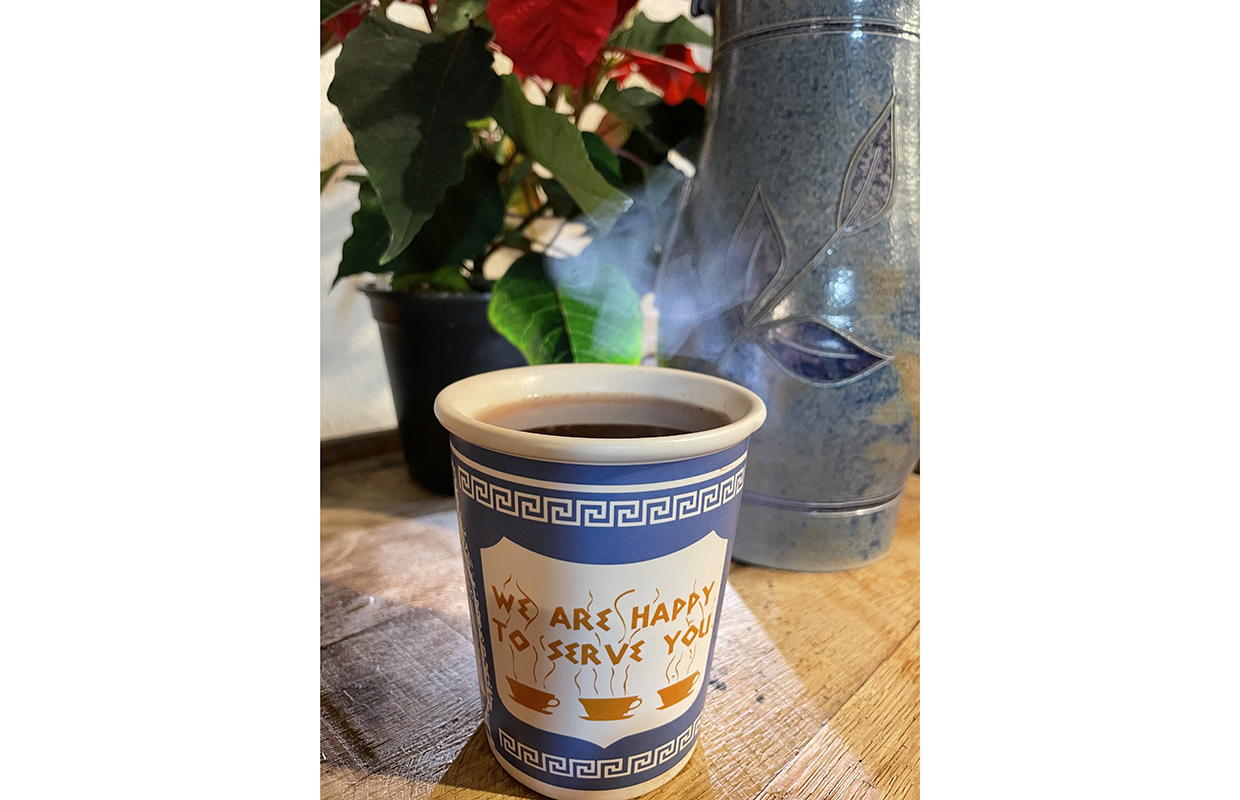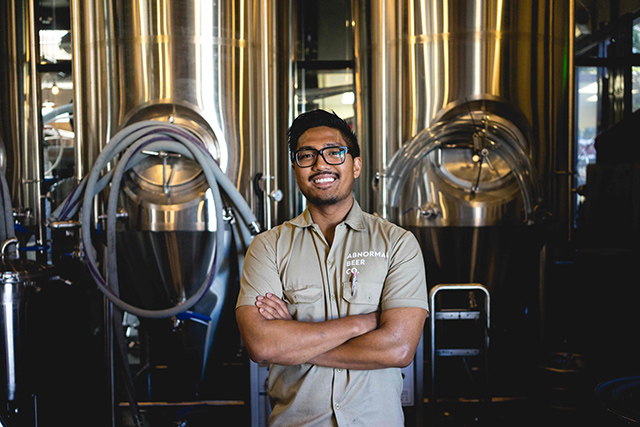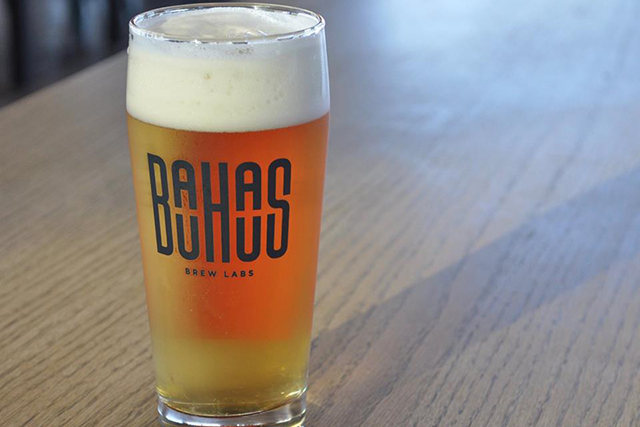
This Saturday in Longmont, Colorado, a few breweries are looking to make “hot beer” the next winter beverage trend. Digging into the archives of regional brewing practices, Primitive Beer is teaming with fellow Colorado breweries WeldWerks and Cohesion to offer up selections of this northern European tradition with the inaugural Hot Bierfest & Holiday Marketplace.
Inspired by Glühwein (hot mulled wine), the Hot Bierfest will showcase separate cultural traditions and methods for beer served heated.
A conversation from a podcast in October coupled with further discussion a week later helped spark the idea of making this event come to life. The two main methods Boldt said they plan to explore with the Hot Bierfest are serving beer mulled with spices in a carafe like contemporary Glühwein or mulled wines and ciders, as well as beer scorched per glass with a red hot iron.
For Primitive, co-founder Brandon Boldt said they are blending a small batch of beer specifically for the purpose of mulling.
“Our Glühbier blend, Willfully Obtuse, is a combination of Primitive Beer aged on cherries (our Oude Kriek-inspired mature beer), on spent grape pomace (Malbec and Petit Pearl varietals), and a small component of young stock that has more vibrant yeast-derived fruitiness and restrained acidity,” he explained to Brewer. “This four-beer blend will receive a treatment with honey, citrus, and spices similar to the recipe described above and served hot from a carafe.
“The blend of beers is implemented to reach the desired acid and tannin balance that falls somewhere between the base of Glühkriek and Glühwein.” (See a recipe idea from Boldt below)
Last fall WeldWerks was looking into making an American-style winter warmer ale. While doing research on Winter Warmers, WeldWerks head brewer Skip Schwartz became fascinated with the origins of the style, which he said was developed in medieval England as Wassail.
“A Wassail is a bowl of hot spiced Ale, usually mixed with ginger, brown sugar, grated nutmeg, citrus peel (orange or lemon), eggs and usually spiked with scotch or whiskey,” he said. “While working through the recipe I really wanted to see the spirit aspect in the final beer. So we landed on letting the beer age in 14-year-old Wild Turkey barrels.
“These barrels were selected because they are known for their notes of candied orange, brown sugar, charr, oak and tobacco flavors, which sounded like the perfect backbone for this beer.”
After 14 months resting in oak Schwartz said they wanted to play off the candied orange flavors that were developed and used orange zest of fresh oranges along with using the traditional Wassail spices of ground ginger and nutmeg to round out the beer.
“We think it is perfect for drinking cold or hot, either way it is sure to keep you warm during these cold winter nights,” he said.
The beer will be served using the hot poker method.
Boldt said when considering the “poker method” for heating beer, starting with a malt forward English Ale or dark German or Czech Lager are great starting points, although a range of styles may work beautifully.
“What we are looking for with the poking method is the creation of brilliant complex melanoidin and maillard reactions between the red hot iron and sugars in the beer, scorching your solution to perfection,” he said. “Similar to the mulling method, additional sugar and spices may be added directly to finished beer for achieving your desired balance, especially if adding spirits to your mix.
“The general recipe is to insert a red hot poker into your glass of beer (and any additives) for 3-5 seconds while gently stirring.”
Cohesion is bringing a beer that was already in the works but co-founder Eric Larkin said it was perfect for this occasion. Its Winter Special, vánoční speciální pivo, is a Garnet-colored Lager that is 6.5% ABV and brewed with Troubadour malts and Czech whole cone hops.
“We’ve crossed Czech techniques for Winter Lagers with Colorado ingredients to produce a rich, toasted malt profile,” Larkin said. “With a hint of spice, chocolate, and plenty of bready flavors, this lager will keep you toasty throughout the winter to come.”
The festival coincides with Primitive Beer’s annual holiday marketplace which features local craftspeople outside the alcohol industry and celebrates the rich legacy of local commerce with the art of fermentation.
The educational experience will be completely up to the consumer at the event, Boldt said.
”At each of our respective breweries we offer our guests the opportunity to get “fully in the weeds” with discussions pertaining to beer history, production and serving techniques, and culture but we don’t force this upon those who are merely looking for a casual pint,” he said. ”In the same way, we are prepared to discuss the respective traditions and preparations for the different styles of hot beer each brewery is offering, but those who visit Primitive and “attend the fest” are also welcome to sample hot and cold beer alike without any required learning experience.
”We want to offer a learning opportunity without pretension or pressure.”

Boldt pointed out that there is no shortage of history to pull from when it comes to offering the modern consumer a new experience.
”We are still in the infancy of craft beer in the United States, with a constant debate as to the importance and current practical and pedagogical methods for defining and communicating classical styles of beer as well as for how to allow new styles to evolve, develop, and receive classification,” he said. ”There is a lot of work to be done in terms of equitably and inclusively providing education for those interested in beer and for more efficiently conveying the important characteristics of beer styles to those who have no interest in beer education and prefer to remain casual beer drinkers.”
Primitive uses traditional serving techniques as a means of teaching, offering its young tranquil beers — an uncarbonated equivalent to Lambic) — from beer engines as opposed to an effervescent mature beer from bottles in baskets (equivalent to Geuzue).
”The differentiation of serving method in correspondence to beer maturity often naturally stimulates conversation and learning in an informal setting, as does the inclusion of traditional production,” Boldt said.
When it comes to inspiring other breweries across the country to dig into the past to find beer styles and techniques to use, Boldt said to experiment and have fun.
“While we laid out some great styles to begin understanding the dynamics that heat provides a beer tasting experience, we are not suggesting these are the only styles and methods that will create a tasty and warming result,” he said. “Worst case scenario, you dump some beer, learn something, and try again.”
Curious to try? Here’s some tips from Boldt.
Consider Heating Method: For spiced mulled beer/Glühbier, begin by using a beer structured with acid and tannins that approximates the balance of red wine or a dry cider as your base. A range of sour and fruited beer styles could work as “substitutes” for contemporary wines and ciders.
Sugar Source: Given the pasteurization and hot dispensing of your Glühbier, a sugar source and mulling spices can be added to your carafe directly before serving to provide counterbalance to your base without the fear of refermentation or needing to dial complex spices into the original fermentation of your beer.
Pick a Base: Glühkriek is a specifically “popular” style of Glühbier that uses Kriek (typically a Belgian Sour beer matured on cherry) or Kriekenlambiek (Lambic rested on whole cherries) as a base for mulling, given the vinous qualities that complex sour beers with cherry may possess.
A starting point for a recipe could look something like this:
- 1 (750-milliliter) bottle Oude Kriek
- 1/2 medium orange
- 3/4 cup water
- 1/4 cup turbinado or granulated sugar
- 20 whole cloves
- 5 pods cardamom
- 2 cinnamon sticks
– Using a citrus peeler, remove the zest from the orange in wide strips, avoiding the white pith; set aside. Juice the orange and set the juice aside.
– Combine the water and sugar in a large saucepan and boil until the sugar dissolves. Reduce the heat and add the cloves, cardamom, cinnamon, orange zest, and orange juice. Simmer until a fragrant syrup forms, about one minute.
– Reduce the heat further and add the beer. Let it barely simmer for at least 20 minutes but up to a few hours. Keep an eye out so that it doesn’t reach a full simmer.
– Strain and serve in small mugs (add a shot of rum, cognac, or whiskey and garnish with the orange peel if desiring more “heat”).




Be the first to comment